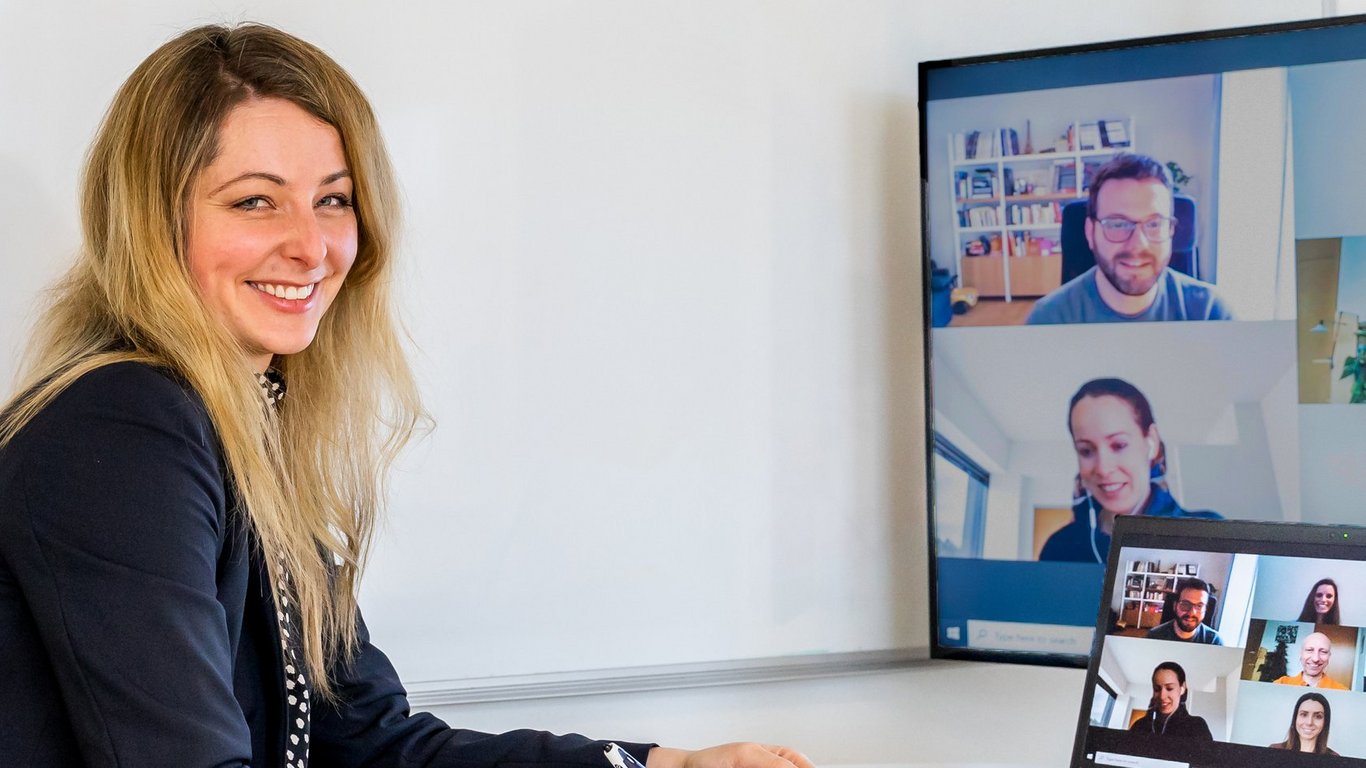Jacqueline Hitzler calculates the future. As head of the Controlling department for autonomous driving and digital business models at Daimler Truck, she and her teams are accompanying investments in new technologies – from alternative propulsion systems to self-driving trucks. In this interview, she tells us what impressed her the most during the various stages of her career in Asia, and what motivates her in her job.

Looking Ten Years into the Future
Ms. Hitzler, you evaluate and support development and investment projects, and also partnerships, for the trucks of the future. When will we see the new technologies on the road?
That varies a lot. One project that my team and I have supported, for example, is the acquisition of Torc Robotics. This US-based company develops concepts for highly automated trucks and has been part of the Daimler Truck family since 2019. The first trucks incorporating Torc Robotics technology are already being road-tested on US highways. Our goal is to start series production of SAE level 4 trucks during this decade - vehicles close to series production can be seen on North American roads much earlier, of course. This also refers to the partnership for autonomous truck driving systems with the Google subsidiary Waymo, which we entered into last year. For other projects, however, if all goes well, the first products should be coming out in the near future. Whenever we assess the cost-effectiveness of investing in new technologies, we always look five to ten years into the future.
Ten years is a long time. How do you do your assessments?
It is a real challenge, which also sets us apart from traditional Controlling. When it comes to the financial planning for other units, our colleagues are able to rely on a wealth of empirical data such as how profit will develop, or how historical costs are distributed. With new technologies and business models, we need to break new ground and calculate more with assumptions and hypotheses. We work on a much more inter-disciplinary basis and have a network of experts in Development, Marketing and Sales. Collaboration and a dialogue with Daimler's M&A unit, which also ensures networking with the relevant technology and innovation partners, are particularly important. Of course, we also work closely with analysts and carry out our own comparisons with other companies.
How does your work with other business units look like?
When we have a particular project, for example relating to the development of fuel cells, we organize expert panels in which we discuss important trends. At the same time, we observe developments at other tech companies and their financing activities. We incorporate the results into our evaluation models, which we use to weigh up whether it is worth investing in a project, and what finances it will require. I am always in contact with our experts in order to stay informed. Being a good listener is important in my job.
How is the department that you are leading, set up?
Within the Controlling department for autonomous driving and digital business models at Daimler Truck, I am responsible for four teams consisting of two or three colleagues each. We are also in close contact with a team in the US and Japan. Each team works on its own future-related topic, such as autonomous driving, connectivity or fuel cells, as well as the overarching reporting and investment topics that are always involved.
What all of us at Daimler Truck around the world share, is the ambition to achieve the best, create something new, and grow. It's simply part of the Daimler Truck mentality.
You have spent a lot of time working in Asia. What do you like about that part of the world?
Asia has always been very fascinating to me. As an adolescent, I travelled to Cambodia, Thailand and Singapore. I just loved the wide variety of countries and cultures, and above all the economic dynamism and diversity. Studying "Economics, Culture and Languages Southeast Asia" at the University of Passau, Germany and Silapakorn University in Bangkok, Thailand was the perfect thing to do.
You went on to join the Daimler Truck Group at Fuso in Japan. How did that come about?
I discovered the job offer from Daimler Truck through our alumni network. I was drawn to Japan and I wanted to put my experiences from my degree into practice. Three months later, I was in Tokyo starting work at Fuso in Life Cycle Management for Light-Duty Trucks. The Fuso Canter had just come out and I was thrilled to be helping with the creation of a new product. After a while, I transferred to the Heavy-Duty Trucks division as a project controller.
How was your time in Japan?
The country really offers a fascinating mix of tradition and modernity. There are strict work hierarchies and set roles. At the same time, Japan is characterized by a great ambition for modern technologies and innovations. The people are very open when it comes to human-machine interaction.

In fact, you actually chose Daimler Truck twice. What characterizes the company as an employer for you?
You mean because after working for Daimler Truck in Japan, I went to work for an automotive supplier in Bangkok, and later worked as a CFO in India? When it comes to my career, the most important thing for me is that I am constantly tackling new challenges. That is why the focus on innovations and future technologies instantly inspired me. In terms of subject matter, it was a big opportunity to be able to play an influential role with respect to the topics of the future.
What do you consider to be special about the work atmosphere at Daimler Truck?
Daimler Truck is characterized by people with their own individual backgrounds and cultures. Working for Daimler Truck in Japan is different from working for Daimler Truck in Germany. Getting to know both sides is of course incredibly motivating. What all of our colleagues around the world share is the ambition to achieve the best, create something new, and grow. It's simply part of the Daimler Truck mentality.
And on a personal note: what item is an absolute necessity in your dream office?
I think the COVID-19 pandemic has shown us that it's not so much the office that matters, but the people. If my colleagues are enthusiastic about their work, then something great can happen, no matter where. That is why at Daimler Truck, I am exactly in the right place.
Personal details:
Jacqueline Hitzler (38) likes using financial indicators and analyses to find out what it will take to turn business ideas into successes. On account of her fascination with how international relationships work and how global supply chains are organized, she decided to study "Economics, Culture and Languages Southeast Asia" at the University of Passau, Germany and Silapakorn University in Bangkok, Thailand. When it comes to her time working in Asia, she particularly values her experiences in India with its dynamic business environment, high level of pragmatism and cultural diversity. But apart from pragmatism, the native of Augsburg in Germany also values perfection, and not just when she is supporting innovations and new business models on the finance and controlling side with her Controlling teams at Daimler Truck. Jacqueline Hitzler has danced ballet since she was a child, which requires utmost concentration for every step. This is exactly the kind of challenge that the Controlling specialist loves.